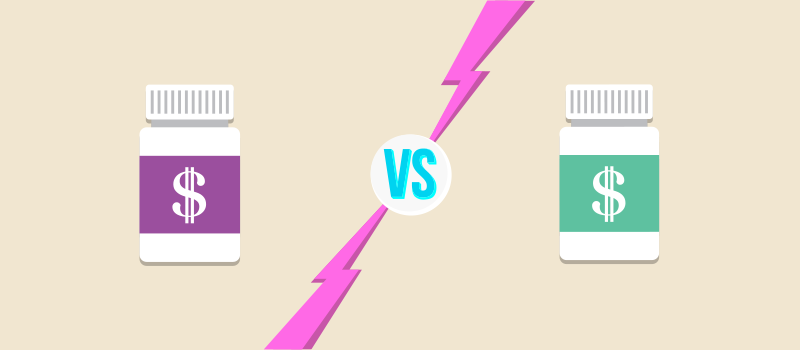What’s the Buzz
The Bee Healthy Blog
Choosing Health Insurance: HDHP vs. PPO

Whether employed or choosing a health insurance plan on the marketplace, open enrollment can feel a bit overwhelming and sometimes confusing. Do you pick a PPO (preferred provider organization)? Or should you go for an HDHP (high deductible health plan)? And what exactly is an HSA (health savings account)?
HDHP vs. PPO is a critical decision that will affect your monthly premiums, healthcare costs, and access to medical care in the coming year. Continue reading to learn more about HDHP and PPO, including the health benefits, out-of-pocket limits, and medical costs associated with each of them.
Definitions Used in Health Insurance
Monthly Premium: This is what you pay every month for your healthcare coverage.
Deductible: This is what you will have to pay out-of-pocket for health services before your insurance provider starts to cover medical expenses.
What is a PPO (preferred provider organization)?
A preferred provider organization plan (PPO plan) is a type of health insurance plan that contracts with specific healthcare providers (doctors and hospitals). Meaning, a PPO healthcare plan creates a network of participating health care providers. If you sign up for a PPO, your medical costs are less if you seek medical care from healthcare providers in the plan’s network (this is called an in-network provider). You can seek medical care from doctors and hospitals outside the PPO plan network (an out-of-network provider), but it will result in higher healthcare expenses and out-of-pocket costs.
What is an HMO (health maintenance organization)?
Health maintenance organizations (HMOs) are health plans in which you have to see your primary care physician first for any health problem. If your PCP cannot treat the condition, they can refer you to a specialist in the plan’s network. The key difference between an HMO and a PPO is that you can get insurance coverage out-of-network with a PPO, albeit at a higher cost.
What is an HDHP (high deductible health plan)?
This is a type of health insurance plan with a high deductible associated with it. As mentioned above, the deductible is the amount the health plan subscriber must pay upfront before the insurance carrier will cover the cost for care. In 2022, a high deductible health plan, per the IRS, is any plan that has a deductible of $1,400 or more for an individual or $2,800 or more for a family. The total out-of-pocket maximum for an HDHP (including deductibles, coinsurance, and copayments) cannot be over $7,050 for individuals or $14,100 for families. (This limit does not apply to out-of-network services).
You may be wondering who would be interested in a high deductible plan if the upfront out-of-pocket costs are higher. Although the out-of-pocket costs are higher, the monthly premium, in comparison to other types of health plans is lower. For younger and/or healthy individuals who don't visit the doctor frequently, this can be a less expensive health plan option.
What is an HSA (health savings account)?
People who choose high deductible health plans (HDHPs) can combine them with a savings account (HSA). This is a savings account with tax advantages (free of federal taxes). You own the account, but both you and your employer can make regular contributions to your HSA.
You can use the money in your HSA to pay for certain qualified medical expenses that are not covered by your HDHP health insurance, including medical, dental, and vision care expenses as well as prescription drugs. In 2020, the CARES Act allowed HSA funds to be used for certain additional items, including over-the-counter medications and health products during the COVID-19 pandemic.
There is an annual cap on the contributions you can make to your HSA ($3,650 for individual plans and $7,300 for family plans in 2022). The balance in your HSA rolls over, so you can build up reserves for the future. Your HSA funds stay with you if you change jobs, and they can be shared with your family (for example, to pay for a child’s medical expenses).
Is it better to have a PPO or HDHP?
There are pros and cons to both the PPO option as well as the high deductible health plan option. Let's explore what those pros and cons are to determine which is a better option for you and your family.
With preferred provider organizations (PPOs), you will pay higher monthly premiums, but you will have lower deductibles. So, if you need medical care, your out-of-pocket expenses will be lower. However, you may have to pay more to access medical providers who are out of network.
In general, HDHPs are beneficial for people who are younger and healthier and do not expect to need much medical care during the year. The advantage is the lower monthly premiums. Another advantage is if you combine your HDHP with an HSA, you can pay the deductible and other qualified medical expenses from the money you’ve set aside in this tax-free account.
On the other hand, PPOs are beneficial for people who are older, who have families, and who expect frequent doctor visits due to age or chronic conditions. The advantage is that you have a low deductible and fewer out-of-pocket expenses when you obtain medical care.
When should I choose an HDHP plan?
If you are a young person in reasonably good health and you don’t have a family, a chronic health condition, or anticipate many medical expenses or doctors’ visits, then an HDHP could be a great option for you. You will be covered for health care while paying smaller monthly premiums. Another consideration when reviewing the option of HDHP versus PPO, is reviewing the prescription coverage. Each high deductible plan can be unique in respect to prescription coverage. Some plans apply the cost of your prescription toward the deductible, while others do not, and instead apply a co-payment. This is important to consider if you are on an expensive prescription drug. Prescription drugs are priced according to their tier level (Tiers 1, 2, or 3). Drugs within Tier Level 3 are the most expensive and could mean hundreds of dollars out of pocket each month if coverage is dependent on the deductible being satisfied. However, keep in mind that you will have to pay out of pocket until you meet the high deductible, should some health problems crop up or should you seek emergency care during the year.
What are the pros and cons of selecting a high deductible insurance plan?
Pros
- You have lower monthly premiums for insurance coverage.
- You can combine your HDHP with a health savings account (HSA) and use it for future out-of-pocket medical expenses.
- Your HSA has tax benefits (it uses pre-tax dollars and accrues tax-free earnings).
- The money in your HSA rolls over from year to year.
- You may benefit from employer contributions to your HSA.
Cons
- You have a higher annual deductible, so your out-of-pocket costs on your medical bills are higher.
- There can be fees on your HSA for monthly maintenance or debit card use.
- Some claims may be denied if they’re not eligible for medical expenses from an HSA.
- If you’re under the age of 65 and use your HSA for nonqualified expenses, you might get slapped with taxes and penalties.
What are the pros and cons of PPOs?
Pros
With PPO plans, you have lower deductibles, meaning you have lower out-of-pocket costs when you utilize the health benefits of your plan.
You have the flexibility to choose a doctor or hospital of your choice, even if they are not in-network providers.
You can see a specialist or have tests and procedures done without needing approval from your primary care physician.
Cons
You pay higher premiums.
Which is better: HMO, PPO, or HDHP?
It all comes down to the following questions:
- How often do you go to a doctor’s office?
- Do you have a planned surgery coming up?
- Do you have a chronic condition that requires frequent treatment?
- How important is flexibility in choosing a doctor or seeing a specialist?
- What are your prescription drug coverage needs? What tier level are your prescription drugs on?
There is no way of knowing what will happen in any given year and how much medical care you will need. So, while the lower premiums of an HDHP may look tempting ($150 versus a monthly premium of $450 for a PPO), it’s only going to be a better deal if you remain relatively healthy. The best way to decide is to run some numbers, see what you’re currently spending on healthcare costs on average each year, and then pick between HDHP vs. PPO accordingly.
References:












SOCIAL